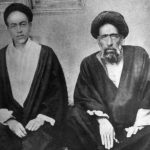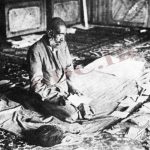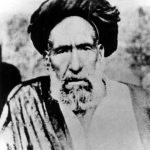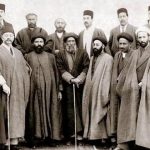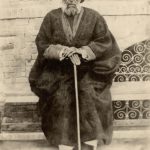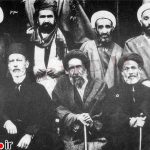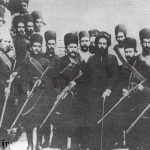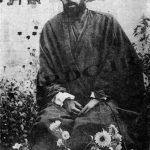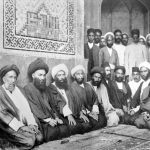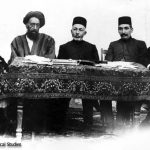Ayatollah Sayyid Hassan Modarres was born in 1870 in a village near Ardestan, a city in Isfahan province. His had a poor but religiously devoted family.
Modarres started his studies with his father and continued them at the seminary of Isfahan. After 13 years, he attained the status of Ijtihad; but he left for holy Najaf in Iraq to continue his studies beside the sacred shrine of Imam Ali (AS). He attended the courses of eminent ulema of Najaf for 7 years. One of these brilliant masters of Islamic sciences was Grand Ayatollah Sayyid Hassan Shirazi, famous for his fatwa against the British colonial bill to confiscate Iran’s tobacco industry.
Ayatollah Modarres returned to Isfahan at the age of 35 as an outstanding scholar and a precious Mujtahid. This was simultaneous with the developments in the aftermath of Constitutional Movement in Iran. From the very beginning, Modarres announced his support for the movement along some of the other ulema to curtail the dictatorship of the illiterate agent of British regime, Reza Khan Mir Panj.
Ayatollah Modarres had learnt this from Islamic teachings which emphasize on political and social issues. A Muslim has social responsibilities and his duties are not limited to individual acts of worship. The practice and behavior of the Prophet and his infallible successors show that they were never indifferent to the fate of the society. Great ulema, too, have always tried to solve the problems of people. But the colonial powers, especially Britain, have incessantly propagated that religion is separate from politics as they found that if Muslims interfere in political affairs of their countries, foreign-backed governments would be ousted and the path for pillaging the resources and reserves of Islamic nations would be blocked. Ayatollah Modarres, sensing the great danger of separation of religion and politics, said, “Our politics is the same as our religiosity; and out religiosity is the same as our politics.”
Ayatollah Modarres enters the arena of politics as a wakeful and conscious religious scholar. According to the Constitution of that era, 5 jurisprudents should supervise the laws of parliament to be compliant with Islamic criteria. Ayatollah Seyyed Hassan Modarres was one of these jurisprudents. Thus, in 1909, he came to Tehran and in his first speech at the parliament called everyone to unity and cooperation to achieve the goals of Constitutional movement and serving the people. But the parliament was closed down due to the Russian intervention and the stake of return of despotism. Ayatollah Modarres, used the opportunity to organize the affairs of religious seminaries and the students of these seminaries in a bid to train conscious and insightful ulema for the future of the country. Moreover, his house became the place of commutation of people and resolving their problems. The high number of votes of the people of Mashhad for Ayatollah Modarres in various rounds of the parliament, despite rigging by the government, indicated his high position among the people. Modarres was the real defender of the people’s rights inside and outside the parliament; hence he was the target of assassination attempts several times. Another factor which endeared him among masses was his simple way of living and compliance with the low strata of society. His astuteness and lack of dependence on material attachments made him a very brave combatant against oppression and colonialism.
Seeking independence and vehement opposition against colonialism were among the obvious traits of Ayatollah Modarres. Being aware of the international developments and the history of crimes of colonialists, he believed that no colonial government had the right to meddle in the internal affairs of Iran or any other country. During the First World War, the Iranian government declared neutrality which enraged the Russians and the British. The armies of these two governments occupied vase swathes of Iran’s soil in the north and the south of the country and massacred many people. In those days, with the endeavours of Ayatollah Modarres, many religious and national dignitaries got the impetus to form National Defence Committee so that they might prevent further calamities in the country. However, this move failed due to the advancement of the invading forces and Modarres went to Turkey for two years.
Ayatollah Modarres decisively opposed the 1919 agreement which was imposed by the Britain on the gullible premier, Vosuq-ul Dowla. According to the agreement, the affairs and resources of the country would entirely be at the British control. Nevertheless, severe oppositions of the ulema and the awareness of people forced the client government to rescind the execution of the unilateral agreement. After the failure of this plot, the British hatched another plot to bolster their influence in Iran. On February 1921, the staged a coup with the commandment of their stooge, Reza Khan. He was an illiterate, violent and excessively dictatorial person and at first had been appointed to the post of minister of war. Ayatollah Modarres was soon aware of the British stratagem and courageously contested the despotic and oppressive measures of Reza Khan.
When Reza Khan proclaimed the motto of changing the system of government from Constitutional to presidency, Ayatollah Modarres realized that that Britain desired to concentrate power in Reza Khan’s hand under the guise of presidency. Ayatollah Modarres embarked on enlightening the ulema and people about the real purpose of the British so that Reza Khan was forced to retreat from the scheme of formation of so-called presidential system. Shortly after, he called for dismantling the Qajarid dynasty and coming to power of Pahlavi rule which meant his own kingship.
The religious and national leaders, led by Ayatollah Modarres, were severely opposed to this anti-Constitutional bill; but Reza Khan imposed himself as Shah through the British support. In the 6th parliamentary elections, which were supervised by Reza Khan, a lot of pro-government candidates entered the parliament through rigging; but Ayatollah Modarres succeeded in garnering the highest number of votes and enter the parliament from Tehran constituency. Modarres continued his struggles against the dictatorial regime of Reza Khan more strongly. He was several times beaten by the hired agents of the regime and a few times been the target of assassination attempt which he escaped bravely. Once the illiterate British-installed Shah, Reza Khan, who was hysteric with the inexhaustible struggles of Ayatollah Modarres, asked him, “Why don’t you let go of me? What do you want of me?” Ayatollah Modarres answered him very tersely but bravely, “I want you not to be there as ruler.”
Elsewhere, he had said, “If you see that I express my opinion freely on many secrets and utter any truth fearlessly, is because I have nothing and don’t want anything from anyone.”
He also stressed, “God hasn’t given me two things: fear and greed. Anyone who is compliant with national interests and religious affairs I am with him; or else I will be opposed to him.”
The intensive criticisms of Ayatollah Modarres caused Reza Khan to lose his patience and announce in the next round of parliamentary elections that he hadn’t gained a single vote. But this great scholar said ironically, “Why don’t you announce even one vote that I had voted for myself?”
This time Reza Khan was scared of Ayatollah Modarres’s charismatic influence and love among people. Therefore, he ordered him to be exiled to Khaaf in the east of the country and seven years later on December 1, 1937, he ordered his agents to martyr this great combatant and brilliant scholar.
Imam Khomeini described the great character of Ayatollah Modarres in this way, “Our great martyr, Modarres, for whom epithets are deficient and small, was a bright star on the forehead of the country which had been dark due to the oppression and injustice of Reza Shah; and no one can understand the value of this lofty personality unless he had experienced that period. Our nation is indebted to his services and sacrifices.”
 Ijtihad Network Being Wise and Faithful Muslim in the Contemporary World
Ijtihad Network Being Wise and Faithful Muslim in the Contemporary World
